-
 Bitcoin
Bitcoin $104,093.1199
0.77% -
 Ethereum
Ethereum $2,508.1404
-0.13% -
 Tether USDt
Tether USDt $1.0000
0.00% -
 XRP
XRP $2.3627
-2.50% -
 BNB
BNB $650.6914
-0.72% -
 Solana
Solana $172.3789
-0.62% -
 USDC
USDC $0.9998
-0.01% -
 Dogecoin
Dogecoin $0.2312
-3.01% -
 Cardano
Cardano $0.8091
-1.58% -
 TRON
TRON $0.2647
1.37% -
 Sui
Sui $4.0149
-0.58% -
 Chainlink
Chainlink $16.9853
-0.04% -
 Avalanche
Avalanche $24.6408
-3.09% -
 Stellar
Stellar $0.3074
-0.88% -
 Shiba Inu
Shiba Inu $0.0...01585
-1.53% -
 Hedera
Hedera $0.2059
-3.84% -
 Toncoin
Toncoin $3.3636
-1.19% -
 Hyperliquid
Hyperliquid $24.9497
-1.85% -
 Bitcoin Cash
Bitcoin Cash $409.0966
-3.20% -
 Polkadot
Polkadot $5.0928
-0.77% -
 Pi
Pi $1.1100
50.04% -
 UNUS SED LEO
UNUS SED LEO $8.3637
-2.10% -
 Litecoin
Litecoin $99.9699
-3.90% -
 Monero
Monero $334.1963
3.85% -
 Pepe
Pepe $0.0...01356
2.26% -
 Bitget Token
Bitget Token $4.8622
0.08% -
 Dai
Dai $0.9999
-0.01% -
 Ethena USDe
Ethena USDe $1.0002
-0.01% -
 Uniswap
Uniswap $6.9041
-0.32% -
 Bittensor
Bittensor $452.3936
-1.53%
Can a Dogecoin wallet address be reused?
Reusing Dogecoin wallet addresses is technically possible but risky. Each reuse compromises privacy by linking transactions and increases vulnerability to attacks like transaction aggregation. Best practice is to use a new address for every transaction.
Feb 27, 2025 at 08:31 pm
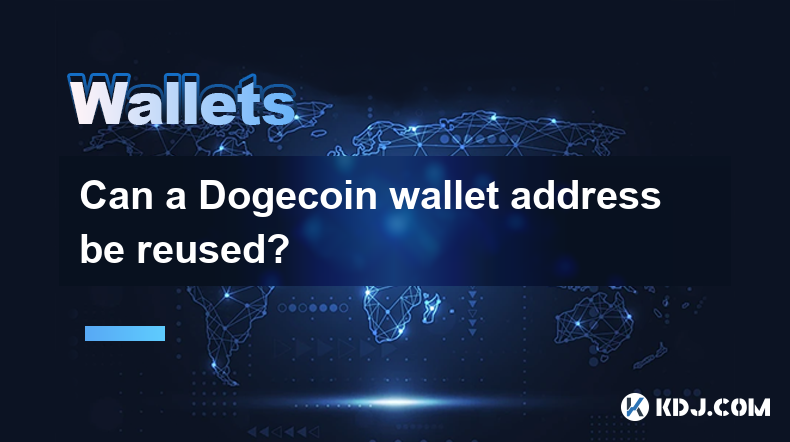
Can a Dogecoin Wallet Address Be Reused? A Deep Dive into Dogecoin Wallet Address Management
Key Points:
- Yes, a Dogecoin wallet address can be reused. However, reusing addresses introduces security and privacy risks that should be carefully considered.
- Privacy Concerns: Reusing addresses links all transactions associated with that address, potentially revealing information about your holdings and spending habits.
- Security Risks: Reusing addresses increases the vulnerability to various attacks, particularly those exploiting transaction aggregation and analysis.
- Best Practices: While technically possible, it's generally recommended to use a new address for each transaction to maximize privacy and security.
- Software vs. Hardware Wallets: Different wallet types offer varying levels of control and address generation capabilities, impacting reuse strategies.
- Understanding Dogecoin Transactions and Addresses:
Dogecoin, like other cryptocurrencies, utilizes a public-key cryptography system. Each Dogecoin wallet possesses a unique public key, which generates a corresponding Dogecoin address. This address serves as the recipient identifier for incoming Dogecoin transactions. The private key, kept secret by the wallet owner, is essential for authorizing the spending of Dogecoin from that address. When a transaction is initiated, the sender specifies the recipient's Dogecoin address. The network then verifies the transaction using the sender's private key and records it on the blockchain. This process is crucial because it ensures the integrity and security of the Dogecoin network. The address itself is a string of alphanumeric characters that acts as a label for the public key. It's important to distinguish between the address and the private key; the address is public and can be shared freely, while the private key must remain confidential. Losing your private key essentially means losing access to your Dogecoin. This is why secure wallet management practices are paramount in protecting your cryptocurrency holdings. Understanding the fundamental principles of public-key cryptography and how Dogecoin transactions are processed on the blockchain is essential to grasp the implications of reusing wallet addresses. The security and privacy of your Dogecoin are directly tied to the careful management of your wallet addresses and private keys. Neglecting these fundamental principles can expose you to various risks, ranging from unauthorized access to your funds to complete loss of your investment.
- The Risks of Reusing a Dogecoin Wallet Address:
Reusing a Dogecoin wallet address, while technically feasible, carries significant risks that impact both your privacy and security. From a privacy standpoint, every transaction associated with a particular address is permanently recorded on the public Dogecoin blockchain. Reusing an address links all your transactions under a single identifier, revealing patterns in your spending habits and the overall balance of your Dogecoin holdings. This information could be exploited by malicious actors or used for targeted attacks. For instance, if you frequently reuse the same address for receiving small amounts of Dogecoin, an observer might infer the approximate size of your holdings, making you a more attractive target for theft. Furthermore, this lack of privacy extends beyond simple observation; sophisticated analysis techniques can combine data from multiple sources to construct detailed profiles of users based on their transaction history. This can have serious implications for your financial privacy, especially in jurisdictions with stringent data protection laws. From a security perspective, reusing addresses can create vulnerabilities that can be exploited by sophisticated attackers. For example, transaction aggregation techniques allow attackers to combine multiple transactions associated with the same address to estimate the total amount of Dogecoin held in that wallet. This information can then be used to craft targeted attacks, such as phishing or social engineering scams, designed to steal your Dogecoin. The risk is amplified if you use the same address for both receiving and sending Dogecoin, as it can inadvertently reveal information about your associated accounts and activities.
- Privacy-Enhancing Techniques for Dogecoin Transactions:
Maintaining privacy in Dogecoin transactions is paramount, and several techniques can mitigate the risks associated with reusing addresses. One of the most effective strategies is to employ a new Dogecoin address for each incoming transaction. Most Dogecoin wallets automatically generate new addresses, simplifying this process. By using a fresh address each time, you effectively create a layer of obfuscation, making it more difficult for observers to track your transactions and link them to a single identity. This significantly enhances your privacy by breaking the chain of transactions associated with a particular address. Furthermore, using different wallets for different purposes can further enhance privacy. For instance, you might dedicate one wallet for receiving payments from online services, another for personal transactions, and a third for long-term holdings. This compartmentalization limits the amount of information revealed through any single address. Consider using a privacy-focused Dogecoin wallet. Some wallets offer enhanced privacy features, such as coin mixing or obfuscation techniques, designed to make it more challenging to trace your transactions. However, it's crucial to research and choose reputable wallets with a strong track record of security. Finally, consider utilizing a VPN service when accessing your Dogecoin wallet or conducting transactions. A VPN masks your IP address, making it harder to link your online activity to your real-world identity. This adds another layer of security and privacy, particularly useful when conducting transactions on public Wi-Fi networks. These strategies, employed together, significantly improve your privacy and security in the Dogecoin ecosystem.
- Security Implications of Reusing Dogecoin Addresses:
Reusing Dogecoin addresses poses significant security risks, making it a practice to be avoided. The most immediate risk is the potential for replay attacks. In a replay attack, a malicious actor intercepts a transaction and rebroadcasts it, attempting to double-spend your Dogecoin. If you reuse the same address, the attacker's attempt might succeed, leading to the loss of your funds. While this is less likely with Dogecoin due to its blockchain's structure, the risk remains. Another significant security concern is the vulnerability to dust attacks. In a dust attack, an attacker sends a tiny amount of Dogecoin to your address, hoping to identify it as active and subsequently target you with more sophisticated attacks. If you reuse the same address, it becomes easier for attackers to track your activity and identify opportunities for exploitation. Moreover, reusing addresses can make you more susceptible to phishing and social engineering scams. Attackers might use information gleaned from your transaction history to craft personalized scams that increase the likelihood of success. They might target you with emails or messages that appear legitimate, attempting to trick you into revealing your private keys or transferring your Dogecoin. Furthermore, reusing addresses increases the risk of being targeted by more advanced attacks, such as those leveraging transaction aggregation and analysis techniques. These sophisticated methods combine data from multiple sources to build detailed profiles of users, making them more vulnerable to targeted attacks. These security risks underscore the importance of using a new Dogecoin address for every transaction.
- Software vs. Hardware Wallets and Address Reuse:
The type of Dogecoin wallet you use significantly influences your approach to address reuse. Software wallets, which are applications running on your computer or smartphone, generally offer the ability to generate new addresses easily. Many software wallets automatically create a fresh address for each transaction, eliminating the need for manual address management. However, the security of a software wallet depends heavily on the security of the device it runs on. Malware or unauthorized access to your device can compromise your private keys and expose your Dogecoin to theft. Hardware wallets, on the other hand, offer a higher level of security by storing your private keys on a dedicated, tamper-resistant device. While hardware wallets also allow for the generation of new addresses, the process might be slightly more involved compared to software wallets. However, the enhanced security offered by hardware wallets compensates for this. The choice between software and hardware wallets depends on your risk tolerance and technical expertise. If you prioritize maximum security, a hardware wallet is recommended, even though the address generation might require slightly more effort. Regardless of the type of wallet you use, always prioritize security best practices, such as using strong passwords, enabling two-factor authentication, and regularly backing up your wallet. Remember, the security of your Dogecoin depends not only on the type of wallet but also on your diligence in managing your private keys and following secure practices. Understanding the nuances of different wallet types and their implications for address reuse is essential for protecting your cryptocurrency holdings.
FAQs:
Q: Is it illegal to reuse a Dogecoin wallet address?
A: No, it's not illegal to reuse a Dogecoin wallet address. However, it's strongly discouraged due to the significant privacy and security risks involved.
Q: How many times can I reuse a Dogecoin wallet address?
A: Technically, you can reuse a Dogecoin wallet address an unlimited number of times. However, each reuse increases the risks to your privacy and security. It's best practice to use a fresh address for every transaction.
Q: What happens if I accidentally reuse a Dogecoin wallet address?
A: While no immediate catastrophic event will occur, you increase your vulnerability to various attacks and compromise your privacy. The extent of the damage depends on the nature and scale of the subsequent transactions.
Q: Can I recover Dogecoin sent to a reused address?
A: Yes, you can still receive and access Dogecoin sent to a reused address as long as you have the private key associated with that address. However, the reuse itself remains a security risk.
Q: Do all Dogecoin wallets automatically generate new addresses for each transaction?
A: Many modern Dogecoin wallets do offer this feature, but not all. Check your wallet's settings and documentation to confirm its behavior. If it doesn't, manually generating a new address before each transaction is strongly recommended.
Q: Are there any benefits to reusing a Dogecoin address?
A: There are no significant benefits to reusing a Dogecoin address. The risks significantly outweigh any potential advantages. The only possible “benefit” might be perceived simplicity, but this is easily overcome by the automatic address generation feature offered by most modern wallets.
Disclaimer:info@kdj.com
The information provided is not trading advice. kdj.com does not assume any responsibility for any investments made based on the information provided in this article. Cryptocurrencies are highly volatile and it is highly recommended that you invest with caution after thorough research!
If you believe that the content used on this website infringes your copyright, please contact us immediately (info@kdj.com) and we will delete it promptly.
- Ethereum (ETH) Often Follows Bitcoin's Market Trends
- 2025-05-12 06:10:13
- What’s the Best Crypto to Buy Now? It’s Not BTC, ETH, or XRP — It’s Priced at Just $0.025
- 2025-05-12 06:10:13
- Can One Token Deliver AI Automation, DeFi Rewards, and 100x Potential? Introducing Unstaked ($UNSD)
- 2025-05-12 06:05:14
- Can Pepe’s rally or Litecoin’s breakout deliver better short-term gains than a daily 100M BDAG prize pool?
- 2025-05-12 06:05:14
- XRP is turning heads again following an impressive show of resilience
- 2025-05-12 06:00:22
- As Momentum Fades From Pi Coin, Investors Are Turning Their Attention To Lightchain AI
- 2025-05-12 06:00:22
Related knowledge
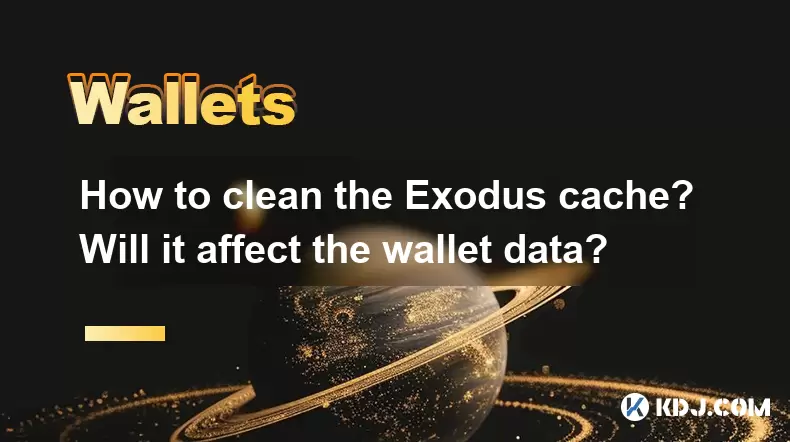
How to clean the Exodus cache? Will it affect the wallet data?
May 11,2025 at 12:49pm
Cleaning the cache in the Exodus wallet is a routine maintenance task that can help improve the performance of the application. However, many users are concerned about whether this action will affect their wallet data. In this article, we will guide you through the process of cleaning the Exodus cache and explain why it does not impact your wallet data....
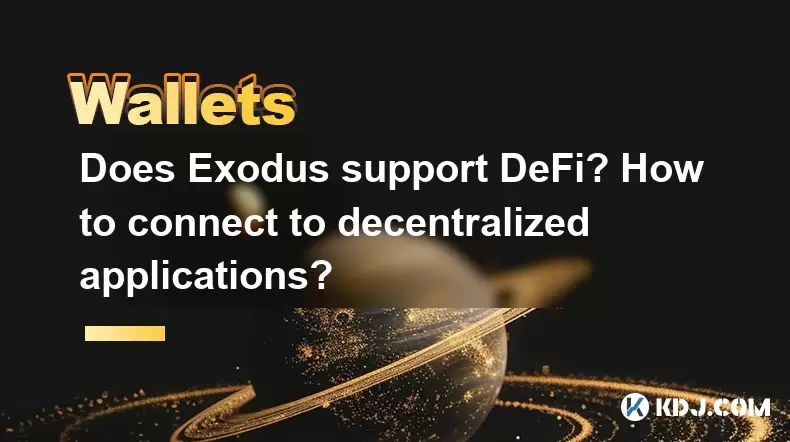
Does Exodus support DeFi? How to connect to decentralized applications?
May 10,2025 at 08:36pm
Does Exodus Support DeFi? How to Connect to Decentralized Applications? Exodus is a popular cryptocurrency wallet known for its user-friendly interface and support for a wide range of cryptocurrencies. However, one of the frequently asked questions among users is whether Exodus supports DeFi (Decentralized Finance) and how to connect to decentralized ap...
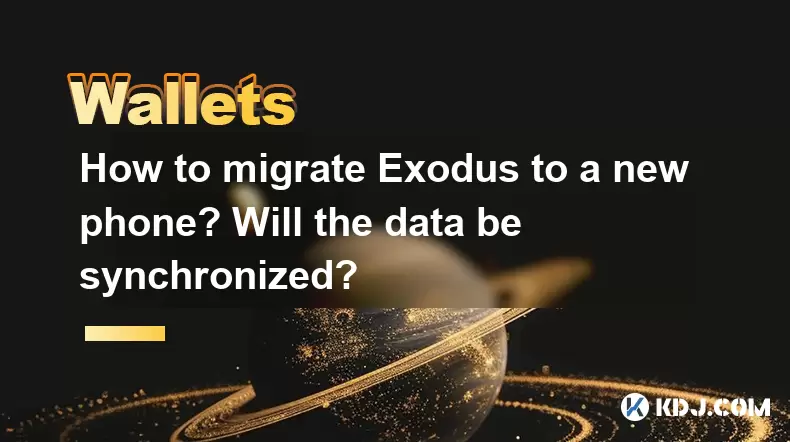
How to migrate Exodus to a new phone? Will the data be synchronized?
May 11,2025 at 03:28pm
Migrating your Exodus wallet to a new phone is a straightforward process that ensures your cryptocurrency data remains secure and accessible. This guide will walk you through the steps to successfully transfer your wallet to a new device, and address whether your data will be synchronized during the process. Preparing for the MigrationBefore you begin t...
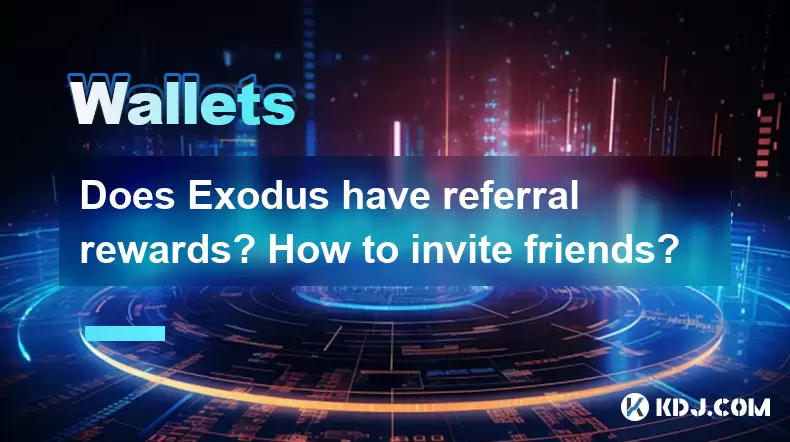
Does Exodus have referral rewards? How to invite friends?
May 09,2025 at 10:01pm
Does Exodus have referral rewards? How to invite friends? Exodus, a popular cryptocurrency wallet, has gained a significant user base due to its user-friendly interface and robust features. One common question among users is whether Exodus offers referral rewards and how to invite friends to join the platform. In this article, we will explore these topi...
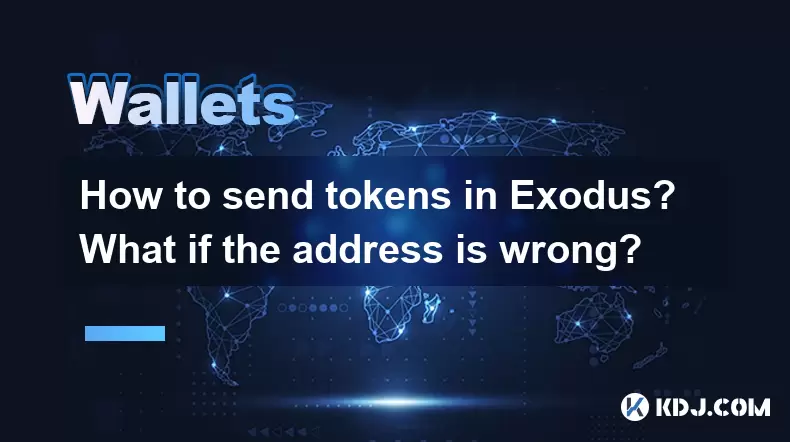
How to send tokens in Exodus? What if the address is wrong?
May 11,2025 at 07:35pm
Sending tokens in Exodus can be a straightforward process if you follow the correct steps. However, it's crucial to be cautious, especially when entering the recipient's address. This guide will walk you through the process of sending tokens in Exodus and what to do if you mistakenly enter the wrong address. Preparing to Send TokensBefore you begin send...
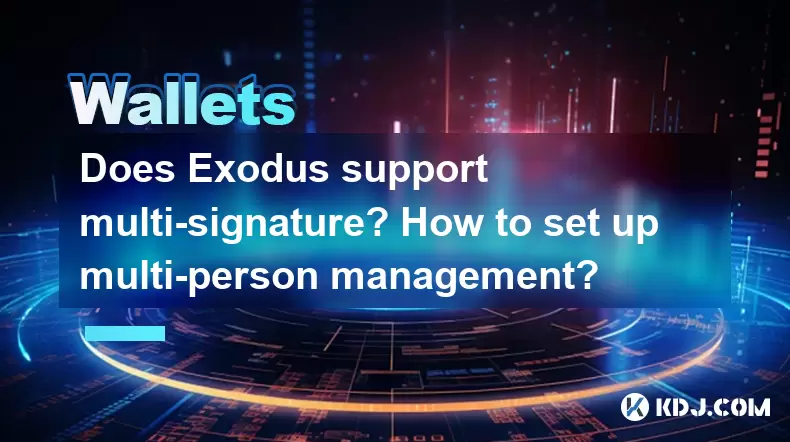
Does Exodus support multi-signature? How to set up multi-person management?
May 11,2025 at 12:01am
Does Exodus Support Multi-Signature Wallets?Exodus, a popular cryptocurrency wallet known for its user-friendly interface, does not currently support multi-signature wallets. Multi-signature (multi-sig) wallets are a type of wallet that requires more than one private key to authorize a transaction, enhancing security by requiring multiple parties to agr...

How to clean the Exodus cache? Will it affect the wallet data?
May 11,2025 at 12:49pm
Cleaning the cache in the Exodus wallet is a routine maintenance task that can help improve the performance of the application. However, many users are concerned about whether this action will affect their wallet data. In this article, we will guide you through the process of cleaning the Exodus cache and explain why it does not impact your wallet data....

Does Exodus support DeFi? How to connect to decentralized applications?
May 10,2025 at 08:36pm
Does Exodus Support DeFi? How to Connect to Decentralized Applications? Exodus is a popular cryptocurrency wallet known for its user-friendly interface and support for a wide range of cryptocurrencies. However, one of the frequently asked questions among users is whether Exodus supports DeFi (Decentralized Finance) and how to connect to decentralized ap...

How to migrate Exodus to a new phone? Will the data be synchronized?
May 11,2025 at 03:28pm
Migrating your Exodus wallet to a new phone is a straightforward process that ensures your cryptocurrency data remains secure and accessible. This guide will walk you through the steps to successfully transfer your wallet to a new device, and address whether your data will be synchronized during the process. Preparing for the MigrationBefore you begin t...

Does Exodus have referral rewards? How to invite friends?
May 09,2025 at 10:01pm
Does Exodus have referral rewards? How to invite friends? Exodus, a popular cryptocurrency wallet, has gained a significant user base due to its user-friendly interface and robust features. One common question among users is whether Exodus offers referral rewards and how to invite friends to join the platform. In this article, we will explore these topi...

How to send tokens in Exodus? What if the address is wrong?
May 11,2025 at 07:35pm
Sending tokens in Exodus can be a straightforward process if you follow the correct steps. However, it's crucial to be cautious, especially when entering the recipient's address. This guide will walk you through the process of sending tokens in Exodus and what to do if you mistakenly enter the wrong address. Preparing to Send TokensBefore you begin send...

Does Exodus support multi-signature? How to set up multi-person management?
May 11,2025 at 12:01am
Does Exodus Support Multi-Signature Wallets?Exodus, a popular cryptocurrency wallet known for its user-friendly interface, does not currently support multi-signature wallets. Multi-signature (multi-sig) wallets are a type of wallet that requires more than one private key to authorize a transaction, enhancing security by requiring multiple parties to agr...
See all articles





















































































